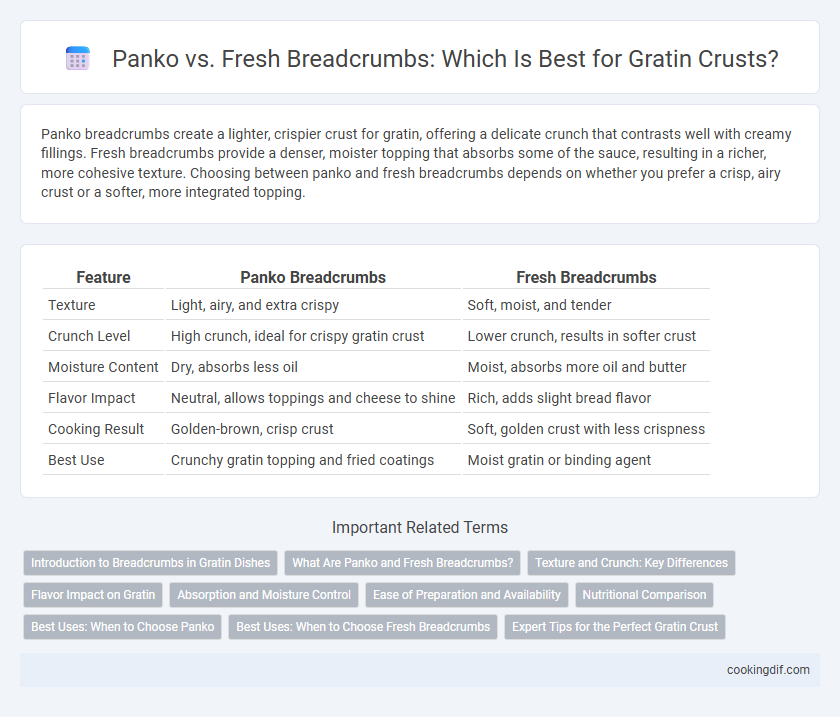Panko breadcrumbs create a lighter, crispier crust for gratin, offering a delicate crunch that contrasts well with creamy fillings. Fresh breadcrumbs provide a denser, moister topping that absorbs some of the sauce, resulting in a richer, more cohesive texture. Choosing between panko and fresh breadcrumbs depends on whether you prefer a crisp, airy crust or a softer, more integrated topping.
Table of Comparison
| Feature | Panko Breadcrumbs | Fresh Breadcrumbs |
|---|---|---|
| Texture | Light, airy, and extra crispy | Soft, moist, and tender |
| Crunch Level | High crunch, ideal for crispy gratin crust | Lower crunch, results in softer crust |
| Moisture Content | Dry, absorbs less oil | Moist, absorbs more oil and butter |
| Flavor Impact | Neutral, allows toppings and cheese to shine | Rich, adds slight bread flavor |
| Cooking Result | Golden-brown, crisp crust | Soft, golden crust with less crispness |
| Best Use | Crunchy gratin topping and fried coatings | Moist gratin or binding agent |
Introduction to Breadcrumbs in Gratin Dishes
Panko breadcrumbs are light and flaky, creating a crispier, airier crust for gratin dishes compared to fresh breadcrumbs, which offer a denser, moister texture that absorbs more sauce. The choice between panko and fresh breadcrumbs directly impacts the gratin's overall texture and flavor, with panko delivering a golden, crunchy topping while fresh breadcrumbs contribute a softer, more cohesive crust. Understanding the moisture content and crumb size of these breadcrumbs helps achieve the desired balance between crunch and richness in traditional gratin recipes.
What Are Panko and Fresh Breadcrumbs?
Panko breadcrumbs are light, airy Japanese-style flakes made from crustless white bread, providing a crispier and crunchier texture for gratin crusts. Fresh breadcrumbs, derived from whole bread including crusts, offer a denser, moister coating that enhances gratins with a rich, golden finish. Both types impact the gratin's texture and flavor, with panko delivering a lighter crunch and fresh breadcrumbs contributing a more substantial, buttery crust.
Texture and Crunch: Key Differences
Panko breadcrumbs create a lighter, airier crust with a distinct crispness, making gratins exceptionally crunchy and less dense compared to fresh breadcrumbs. Fresh breadcrumbs produce a denser, more compact crust that offers a softer texture and a more uniform golden-brown finish. The choice between panko and fresh breadcrumbs directly impacts the gratin's final texture, with panko providing a pronounced crunch and fresh breadcrumbs yielding a tender, cohesive crust.
Flavor Impact on Gratin
Panko breadcrumbs add a light, crispy texture to gratin crusts while maintaining a neutral flavor that enhances the dish's overall creaminess without overpowering it. Fresh breadcrumbs offer a richer, more buttery taste that infuses the gratin with deeper savory notes, contributing to a more robust flavor profile. Choosing between panko and fresh breadcrumbs impacts both the textural contrast and the intensity of flavor, shaping the gratin's final taste experience.
Absorption and Moisture Control
Panko breadcrumbs create a lighter, crunchier gratin crust due to their larger flakes and lower absorption rate, which helps maintain moisture control within the dish. Fresh breadcrumbs absorb more liquid, resulting in a denser, moister crust that can sometimes make the topping soggy. Choosing panko ensures better crispiness and a more distinct texture contrast with creamy gratin layers.
Ease of Preparation and Availability
Panko breadcrumbs offer a lighter, crunchier crust and are widely available in most grocery stores, making them easy to use for gratin toppings. Fresh breadcrumbs provide a richer flavor and softer texture but require more preparation time as they must be made from day-old bread. Panko's convenience and consistent texture make it the preferred choice for quick and reliable gratin crusts.
Nutritional Comparison
Panko breadcrumbs offer a lighter, crispier texture and typically contain fewer calories and less fat than fresh breadcrumbs, making them a popular choice for gratin crusts aiming for a crunch with lower calorie content. Fresh breadcrumbs often retain more moisture and provide higher protein levels due to less processing but may contribute to a denser, softer crust with slightly more fat and sodium. Choosing between panko and fresh breadcrumbs affects the gratin's nutritional profile, with panko favoring reduced calorie intake and fresh breadcrumbs supporting richer nutrient density.
Best Uses: When to Choose Panko
Panko breadcrumbs create a lighter, crispier crust ideal for gratins that benefit from a crunchy topping without becoming dense or soggy. They are best used when a golden, airy texture is desired, especially in recipes with creamy or liquid-heavy ingredients, as panko absorbs less moisture than fresh breadcrumbs. Choose panko over fresh breadcrumbs for gratins that require a distinctive crunch and a visually appealing, textured finish.
Best Uses: When to Choose Fresh Breadcrumbs
Fresh breadcrumbs offer a delicate texture and enhanced moisture absorption, making them ideal for gratins that require a creamy, tender crust rather than a crispy, crunchy topping. They excel in dishes where the breadcrumb topping needs to blend seamlessly with cheeses and sauces, providing a subtle binding rather than a distinct crunch. Fresh breadcrumbs are best chosen for gratins featuring softer vegetables or delicate proteins to maintain a cohesive, rich crust without overpowering crispiness.
Expert Tips for the Perfect Gratin Crust
Panko breadcrumbs create an exceptionally crisp and airy gratin crust due to their larger, flakier texture, which allows for even browning and a lighter finish. Fresh breadcrumbs, while offering a more tender and moist topping, tend to produce a denser crust that absorbs more moisture from the dish. Experts recommend combining panko with grated Parmesan for an ideal balance of crunch and rich flavor, ensuring the gratin crust complements rather than overwhelms the creamy interior.
Panko vs Fresh breadcrumbs for crust Infographic

 cookingdif.com
cookingdif.com